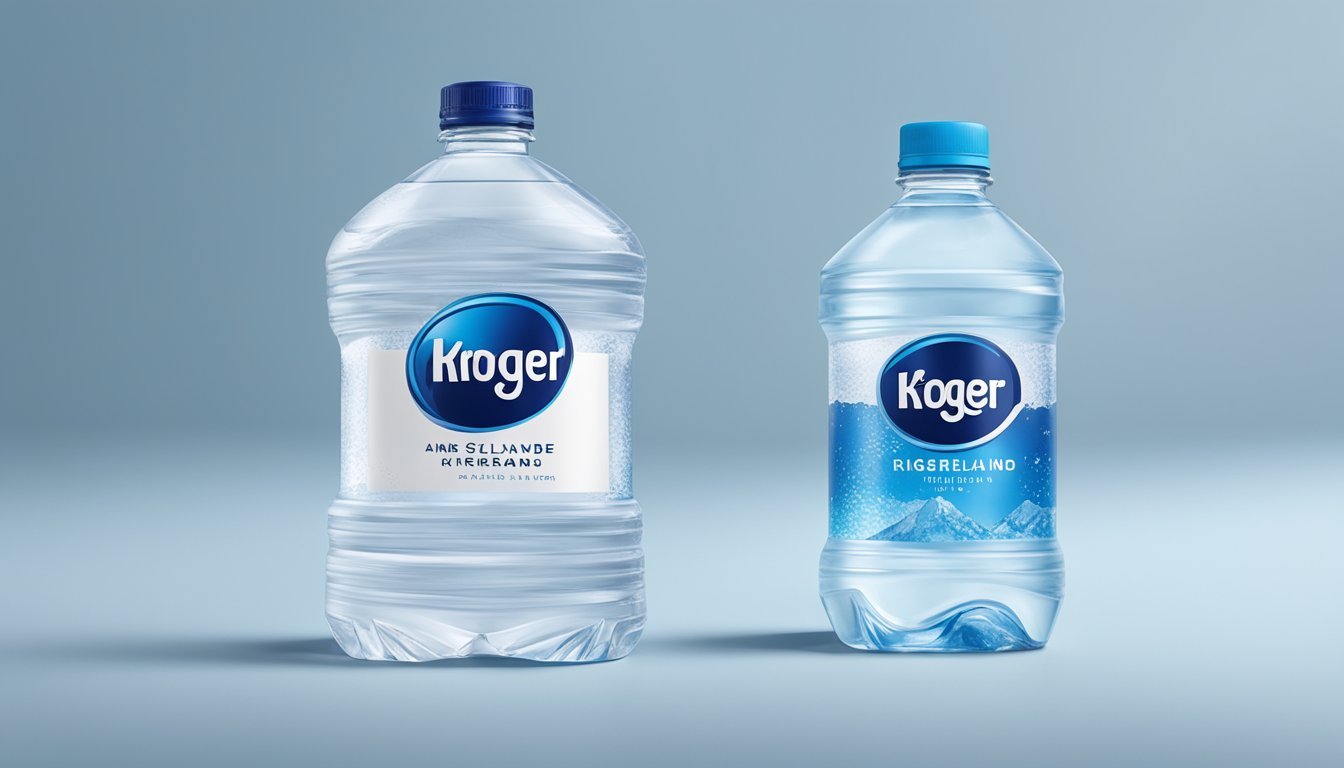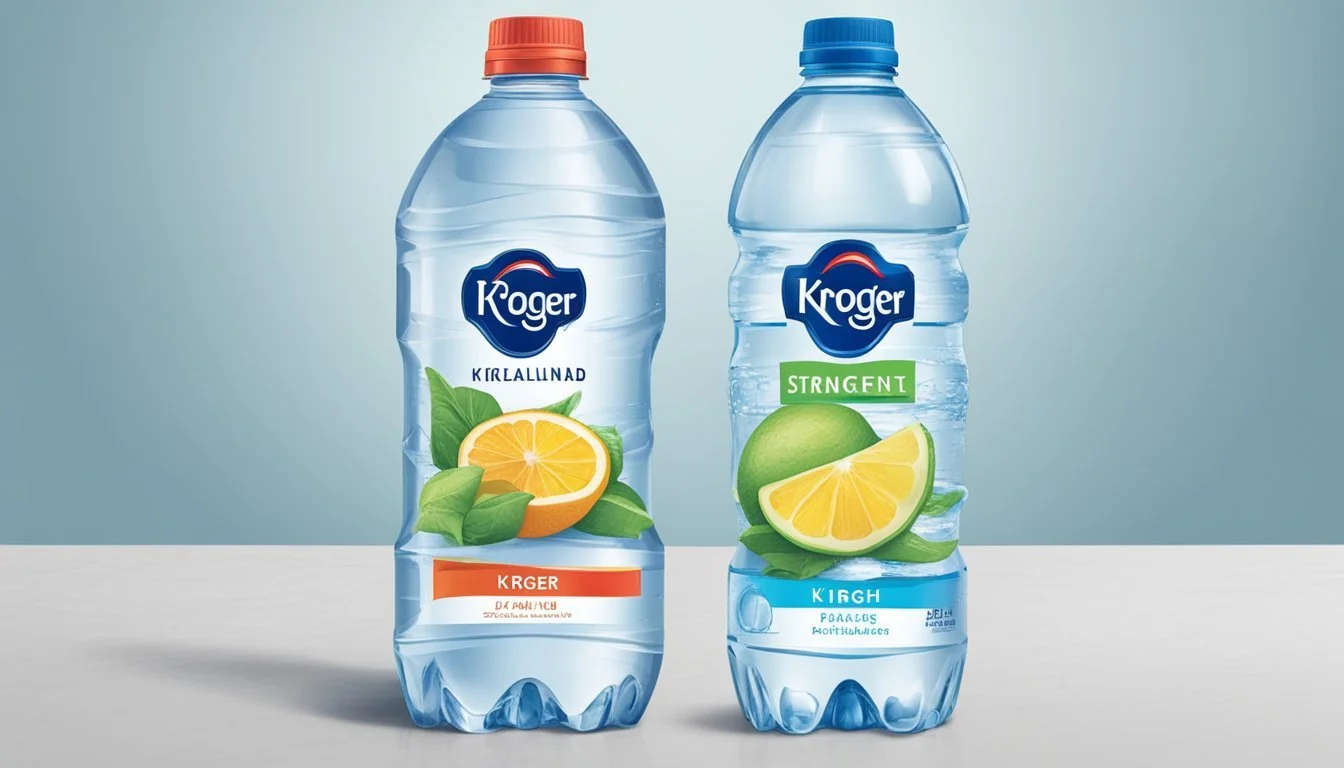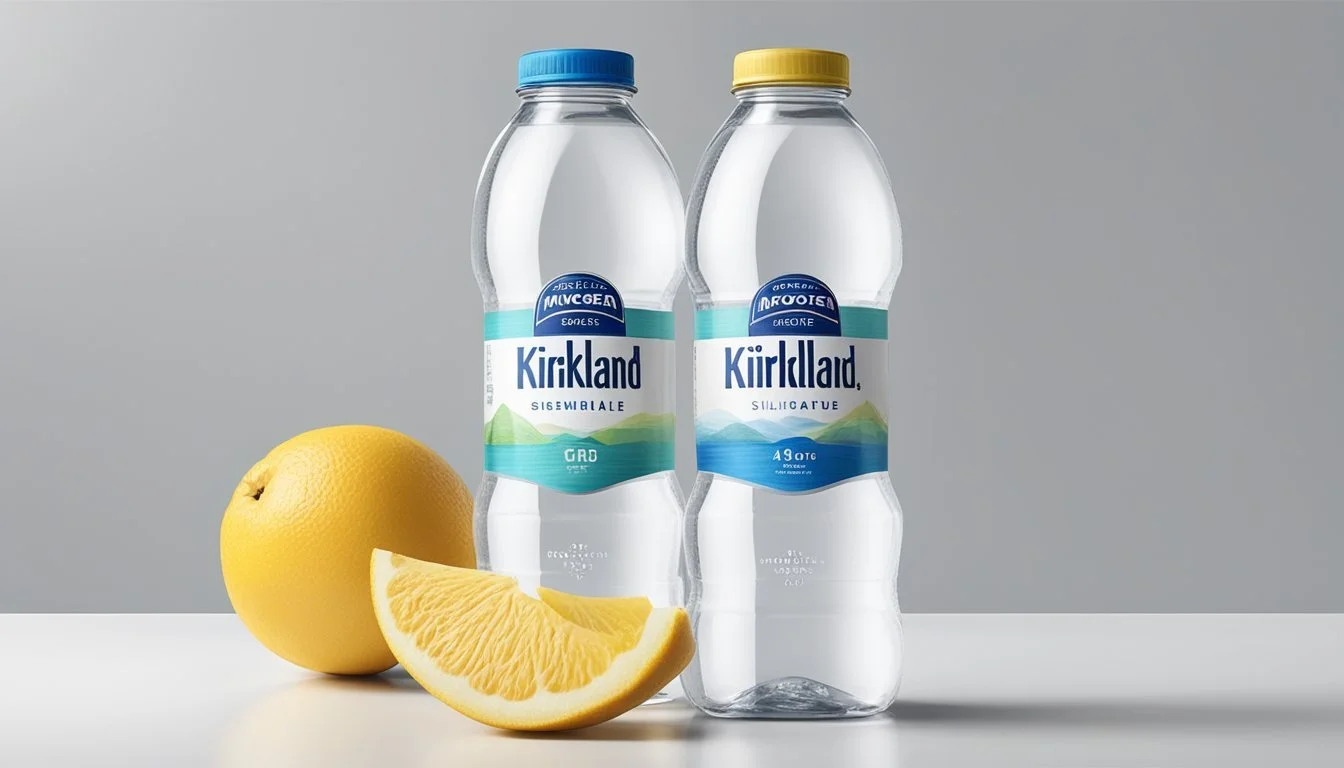Kroger vs. Kirkland Signature
Which Bottled Water is Better? A Comprehensive Comparison
When it comes to choosing the best bottled water, transparency and taste are key factors for most consumers. Kroger bottled water meets FDA regulations, ensuring safety and quality, but concerns about contaminants like microplastics and BPA persist. Many of their bottles are now BPA-free, addressing some of these issues.
On the other hand, Kirkland Signature, a brand well-known for its purified taste, offers a reliable option for those looking for consistency in flavor. Despite its slight saccharine undertone, it maintains a solid reputation for quality and safety.
For consumers prioritizing safety and taste, Kirkland Signature stands out as a reliable choice due to its consistent purified taste and quality assurance. While Kroger provides a safe and regulated option, Kirkland's flavor and reputation might make it the preferred option for many bottled water enthusiasts.
Understanding Bottled Water
Bottled water is a convenient option widely available in the United States. It offers an alternative to tap water, catering to those who prefer the taste, portability, or perceived safety. Both the EPA and FDA have roles in regulating drinking water to ensure it meets safety standards.
EPA (Environmental Protection Agency): Oversees the quality of tap water. It enforces standards under the Safe Drinking Water Act to protect public health from contaminants.
FDA (Food and Drug Administration): Regulates bottled water as a food product. Ensures that it meets similar safety requirements as tap water.
Health-conscious consumers often scrutinize bottled water for potential contaminants. These can include:
Chemical Contaminants: Such as PFAS (found in some water brands), microplastics, and BPA.
Radiological Contaminants: Less commonly found but still a concern.
Kroger bottled water, for instance, adheres to FDA regulations, ensuring safety. However, concerns like microplastics and chemicals persist despite improvements like BPA-free bottles.
Kirkland Signature’s ionized alkaline water features added electrolytes and a pH balance of 9.5, achieved through reverse osmosis. This can appeal to those looking for enhanced taste and potential health benefits.
When comparing bottled water to tap water, both offer safety assurances but differ in taste, portability, and sometimes purity levels. This makes understanding the source and processing methods of bottled water important for informed choices.
Brand Profiles
Both Kroger and Kirkland Signature bottled waters have their own unique attributes, ranging from sourcing to taste, which influence consumer preference.
Kroger Bottled Water Overview
Kroger offers a range of bottled water options under its label, typically focusing on affordability and accessibility. The water is often sourced from municipal supplies and then undergoes a purification process. This includes reverse osmosis, ozonation, and UV light treatment to ensure quality and safety.
Kroger bottled water generally comes in various sizes, including single-serve bottles and larger multi-packs. The taste is described as neutral and pure, catering to a wide audience. Despite its lower price point, the brand maintains rigorous quality control.
The packaging is straightforward, featuring the Kroger branding prominently. Kroger's nationwide presence means their bottled water is readily available in many supermarkets, making it a convenient choice for many consumers.
Kirkland Signature Bottled Water Overview
Kirkland Signature, the private label brand of Costco, is known for its high-quality products, including bottled water. The water is sourced and bottled by third-party suppliers, such as Niagara Bottling, which ensures thorough purification, including microfiltration and reverse osmosis.
Kirkland Signature water is praised for its clean and crisp taste, often compared to more premium brands, yet it is offered at a competitive price. The brand typically provides bottled water in large quantities, aligning with Costco's bulk-sales model.
The packaging of Kirkland Signature water is minimalist, focusing on functionality with clear labeling. Availability is primarily through Costco stores, making it a go-to choice for members who prefer buying in bulk. The brand's commitment to quality and value has helped it gain a strong reputation among consumers.
Water Quality and Purification
Understanding the quality and purification processes for bottled water helps consumers make informed decisions. This section examines the purification process standards and compares contaminant levels in Kroger and Kirkland Signature bottled water.
Purification Process and Standards
Kroger and Kirkland Signature both adhere to stringent purification standards. Kroger uses a multi-step process, including filtration, reverse osmosis, and ultraviolet light to ensure water purity. Additionally, they comply with FDA regulations and provide regular quality reports.
Kirkland Signature, sourced from both natural springs and municipal supplies, also undergoes extensive purification. This includes reverse osmosis, ozonation, and carbon filtration. Their bottled water consistently meets quality standards set by the International Bottled Water Association (IBWA).
Comparing Contaminant Levels
When comparing contaminant levels, both brands strive to maintain low levels of impurities. Kroger's water is regularly tested for contaminants such as microplastics and BPA. While concerns exist, many of their bottles are now BPA-free.
Kirkland Signature water is free from harmful contaminants, meeting safety standards for substances like lead, fluoride, and chlorine. Regular testing helps ensure that any impurities remain well below permissible levels. These measures highlight the commitment to providing safe, clean drinking water.
Taste and Composition
Kroger and Kirkland Signature bottled waters have distinct differences in taste and mineral composition. Understanding these factors can help in selecting the better option for everyday hydration.
Factors Affecting Taste
The taste of bottled water can be influenced by its source, purification process, and mineral content. Kroger bottled water generally comes from a variety of sources including municipal and spring sources. This often leads to a neutral but sometimes inconsistent taste.
Kirkland Signature water, sourced primarily from natural springs, typically offers a more consistent and fresh taste. The natural mineral content can give it a slight but pleasant mineral flavor, often preferred by taste testers. The filtration and purification methods also play a role, with Kirkland employing a rigorous multi-step process.
Mineral Content and Health Benefits
Mineral content in bottled water is crucial for health benefits and taste. Kroger bottled water usually contains lower levels of essential minerals like calcium and magnesium due to its diverse sourcing methods.
Kirkland Signature water, sourced from natural springs, tends to have a higher and more consistent mineral content. This includes beneficial levels of calcium, magnesium, and potassium.
These minerals not only enhance the taste but also contribute to essential bodily functions such as bone health and electrolyte balance. This makes Kirkland a preferable choice for those seeking not just hydration but additional health benefits.
Environmental and Health Concerns
Kroger and Kirkland Signature bottled water products both face scrutiny regarding their environmental and health impacts, particularly around the use of plastic bottles, recycling issues, and potential contaminants detected in the water.
Plastic Bottles and Recycling
Plastic bottles used by both Kroger and Kirkland Signature contribute significantly to environmental pollution. Despite increasing efforts to recycle, a vast quantity of plastic still ends up in landfills. Recycling rates remain suboptimal, leading to persistent waste and environmental degradation.
The production of plastic bottles also involves carbon emissions, contributing to climate change. Additionally, improper disposal of plastic can harm wildlife and ecosystems. Both brands must consider adopting more sustainable packaging options to minimize these detrimental effects.
Health Impacts of Bottled Water
Concerns over the safety and quality of bottled water persist. Some studies show that bottled water can contain various contaminants, including microplastics, BPA, and PFAS chemicals. These substances raise health concerns as they may pose risks over long-term consumption.
Although Kroger ensures its bottled water meets FDA standards, the presence of microplastics and potential chemical leaching from bottles remains an issue. Kirkland Signature also faces similar scrutiny, highlighting the need for more transparency and stringent quality checks in the bottled water industry.
Environmental Working Group's Findings
The Environmental Working Group (EWG) has highlighted issues related to bottled water through its research. Studies have found that a significant portion of bottled water is essentially repackaged tap water. Additionally, EWG reports indicate the presence of harmful chemicals in several popular bottled water brands.
Consumer Reports identified toxic PFAS chemicals in both carbonated and noncarbonated bottled water brands. These findings underscore the need for better regulation and consumer awareness regarding the quality and safety of bottled water products from brands like Kroger and Kirkland Signature.
Label Transparency and Regulations
Label transparency is crucial when comparing Kroger and Kirkland Signature bottled water. Both brands must adhere to federal regulations set by the FDA to ensure their water is safe for consumption. These regulations require detailed information on the label about the product's source and contents.
Kroger bottled water labels generally provide necessary details such as:
Source of the water
Whether the bottle is BPA-free
Compliance with the FDA standards
Kirkland Signature offers similar information but also must comply with stricter state laws like those in California. California regulations frequently mandate even more detailed disclosures on labels.
The International Bottled Water Association (IBWA) further encourages member companies, including both Kroger and Kirkland Signature, to maintain high transparency standards. They recommend listing:
Water source
Treatment processes
Any pertinent analytical data about water quality
Here is a quick comparison:
Category Kroger Kirkland Signature Regulatory Adherence FDA standards FDA and California state laws Source Disclosure Yes Yes BPA-Free Labels Often mentioned Often mentioned Additional Transparency Encouraged by IBWA but varies Encouraged by IBWA and California laws
Understanding these distinctions helps in choosing the better option based on transparency and regulatory compliance. Both brands aim to provide comprehensive and clear labels to meet consumer needs.
Consumer Choices in Bottled Water
Consumers today have a variety of bottled water options, each with distinct characteristics and sources. This section explores the different types of bottled water and the growing influence of water sommeliers in guiding consumer choices.
Understanding Different Types of Bottled Water
Bottled water can be broadly categorized into several types: Purified Water, Spring Water, and Sparkling Water.
Purified Water such as Pure Life has undergone processes like distillation or reverse osmosis to remove impurities and contaminants. This type is often sourced from local municipal supplies.
Spring Water comes from natural springs and is generally known for its refreshing taste. Brands like Mountain Spring Water emphasize their natural origins, which can enhance the appeal to health-conscious consumers.
Sparkling Water contains natural or added carbon dioxide, creating its effervescence. Popular for its bubbly texture, it appeals to those seeking an alternative to sugary sodas. Each type offers different benefits, allowing consumers to choose based on their preference for taste, source, and purity levels.
The Role of Water Sommeliers
Water Sommeliers are experts who specialize in the tasting, sourcing, and pairing of water varieties. These professionals play a crucial role in educating consumers about the subtle differences between water types.
A sommelier might guide a consumer to appreciate the unique mineral compositions in spring water versus the neutral taste of purified water. They also help highlight the nuances of sparkling water, which can vary greatly depending on the brand and carbonation process.
Their expertise ensures that consumers can make informed decisions, much like selecting a fine wine. This added layer of guidance is particularly valuable as the market for premium and specialty bottled water continues to grow.
Pricing and Availability
Kroger bottled water is widely available at Kroger stores and their other chains, such as Ralphs and Harris Teeter. Kroger bottled water typically comes in various sizes, including multipacks, offering flexibility for different needs.
Kirkland Signature bottled water is exclusively available at Costco. It can be purchased individually or in bulk, which often translates to a lower cost per bottle, making it attractive for families or events.
Price Comparison:
Kroger: Prices vary by region. Generally affordable, with bottles often priced between $0.10 to $0.25 each in larger packs.
Kirkland Signature: Known for cost-effectiveness. Bulk packs can lower the price per bottle to around $0.12 to $0.15.
Availability:
Kroger: Available in over 2,700 Kroger Co. grocery stores across the United States.
Kirkland Signature: Available at more than 800 Costco warehouses globally.
Contact Info:
Kroger: Customer service can be reached via their website for specific store information.
Kirkland Signature: Costco’s customer service department handles inquiries and can be contacted through their main website.
Both brands cater to various customer needs, but accessibility depends largely on whether one has a Costco membership for Kirkland Signature or lives near a Kroger-affiliated store.
Conclusion
When comparing Kroger and Kirkland Signature bottled waters, several factors appeal to different consumers.
Kroger bottled water follows FDA guidelines, ensuring safety and quality. Despite some concerns about microplastics and environmental impact, many bottles are now BPA-free.
On the other hand, Kirkland Signature water, often sourced from Niagara Bottling, maintains high standards and is frequently praised for its taste and quality.
Price is a significant factor. Kroger water is generally budget-friendly, often available for frequent shoppers.
Kirkland Signature, commonly found at Costco, offers bulk quantities at competitive prices, appealing to those seeking value for money.
For those who prioritize environmental impact, both brands face similar challenges with plastic waste and pollution.
Consumer preference might also hinge on taste. While both brands generally receive favorable reviews, Kirkland Signature often stands out slightly more in flavor tests.
Bottom Line: The choice between Kroger and Kirkland Signature will depend on individual preferences regarding price, taste, and environmental considerations.
Each brand has its strengths, making either a viable option for bottled water consumption.
More About Kroger
Kroger vs Richard's Rainwater: Which Bottled Water is Better?
Mountain Valley Spring Water vs Kroger: Which Bottled Water is Better?
Whole Foods Italian Still Mineral water vs Kroger: Which Bottled Water is Better?
More About Kirkland Signature
1907water vs Kirkland Signature: Which Bottled Water is Better?
7-Select vs Kirkland Signature: Which Bottled Water is Better?
Acqua Pana vs Kirkland Signature: Which Bottled Water is Better?
Alkaline88 vs Kirkland Signature: Which Bottled Water is Better?
Antipodes vs Kirkland Signature: Which Bottled Water is Better?
Aqua Carpatica vs Kirkland Signature: Which Bottled Water is Better?
Aquafina vs Kirkland Signature: Which Bottled Water is Better?
Arrowhead vs Kirkland Signature: Which Bottled Water is Better?
Big Chill vs Kirkland Signature: Which Bottled Water is Better?
Big Win vs Kirkland Signature: Which Bottled Water is Better?
BodyArmor vs Kirkland Signature: Which Bottled Water is Better?
Boxed Water vs Kirkland Signature: Which Bottled Water is Better?
Cascade Mountain vs Kirkland Signature: Which Bottled Water is Better?
Castle Rock vs Kirkland Signature: Which Bottled Water is Better?
Core Hydration vs Kirkland Signature: Which Bottled Water is Better?
Crystal Geyser vs Kirkland Signature: Which Bottled Water is Better?
Deer Park vs Kirkland Signature: Which Bottled Water is Better?
Erewhon vs Kirkland Signature: Which Bottled Water is Better?
Essentia vs Kirkland Signature: Which Bottled Water is Better?
Eternal vs Kirkland Signature: Which Bottled Water is Better?
Hawaii Volcanic vs Kirkland Signature: Which Bottled Water is Better?
Hawaiian Springs vs Kirkland Signature: Which Bottled Water is Better?
Ice Mountain vs Kirkland Signature: Which Bottled Water is Better?
Icelandic Glacial vs Kirkland Signature: Which Bottled Water is Better?
Just Water vs Kirkland Signature: Which Bottled Water is Better?
Kirkland Signature vs Action: Which Bottled Water is Better?
Kirkland Signature vs CBD Living: Which Bottled Water is Better?
Kirkland Signature vs Crystal Lake: Which Bottled Water is Better?
Kirkland Signature vs Dasani: Which Bottled Water is Better?
Kirkland Signature vs Essence pH10: Which Bottled Water is Better?
Kirkland Signature vs HFactor: Which Bottled Water is Better?
Kirkland Signature vs Proud Source: Which Bottled Water is Better?
Kirkland Signature vs Ramona: Which Bottled Water is Better?
LIFEWTR vs Kirkland Signature: Which Bottled Water is Better?
Liquid Death vs Kirkland Signature: Which Bottled Water is Better?
Mananalu vs Kirkland Signature: Which Bottled Water is Better?
Mountain Valley Spring Water vs Kirkland Signature: Which Bottled Water is Better?
Nestle Pure Life vs Kirkland Signature: Which Bottled Water is Better?
Open Water vs Kirkland Signature: Which Bottled Water is Better?
Ophora vs Kirkland Signature: Which Bottled Water is Better?
Origin vs Kirkland Signature: Which Bottled Water is Better?
Ozarka vs Kirkland Signature: Which Bottled Water is Better?
Perrier vs Kirkland Signature: Which Bottled Water is Better?
Poland Spring vs Kirkland Signature: Which Bottled Water is Better?
Pure Life vs Kirkland Signature: Which Bottled Water is Better?
Purely Sedona vs Kirkland Signature: Which Bottled Water is Better?
Refreshe vs Kirkland Signature: Which Bottled Water is Better?
Richard's Rainwater vs Kirkland Signature: Which Bottled Water is Better?
San Pellegrino vs Kirkland Signature: Which Bottled Water is Better?
Simple Truth vs Kirkland Signature: Which Bottled Water is Better?
Smartwater vs Kirkland Signature: Which Bottled Water is Better?
Solan de Cabras vs Kirkland Signature: Which Bottled Water is Better?
Starkey vs Kirkland Signature: Which Bottled Water is Better?
Talking Rain AQA vs Kirkland Signature: Which Bottled Water is Better?
The Well vs Kirkland Signature: Which Bottled Water is Better?
Topo Chico vs Kirkland Signature: Which Bottled Water is Better?
Tru Alka vs Kirkland Signature: Which Bottled Water is Better?
Volvic vs Kirkland Signature: Which Bottled Water is Better?
Waiakea vs Kirkland Signature: Which Bottled Water is Better?
Weird Water vs Kirkland Signature: Which Bottled Water is Better?
Whole Foods 365 vs Kirkland Signature: Which Bottled Water is Better?
Whole Foods Italian Still Mineral water vs Kirkland Signature: Which Bottled Water is Better?
Zenwtr vs Kirkland Signature: Which Bottled Water is Better?
Zephyrhills vs Kirkland Signature: Which Bottled Water is Better?








